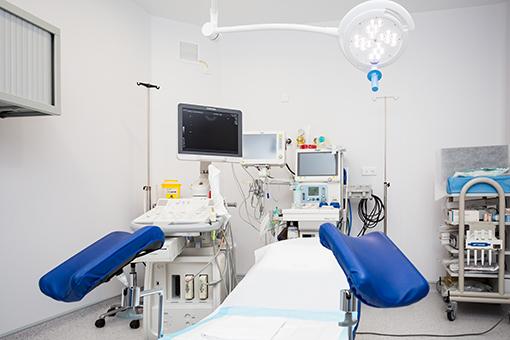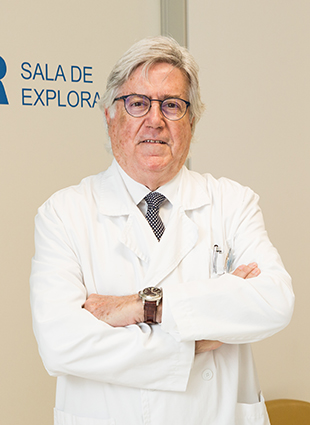
“25 years ago we were already backing genetics, which are significantly involved in the search for the healthiest embryo”
Dr. José Jesús López Gálvez, Chairman and CEO of the Internacional UR Group
Rigour, professionalism, science and personal treatment define the assisted reproduction clinics belonging to the UR Group. What makes you proud of forming part of them for so many years?
The professionalism and the personal treatment present in our units is a determining factor, but the wide-reaching experience that endorses our work is also important. We have been working for almost 40 years in assisted reproduction and this means we have reached a very high level. I am very proud of having been able to develop a personal project based on education and research.
22 years ago I laid down the conditions of the Master in Assisted Reproduction, which in the beginning was a Specialist Course with its Own Qualification and in time it subsequently became an Official Master at the Miguel Hernandez University in Alicante and the Elche Faculty of Medicine. And approximately 15 years ago, I expanded the knowledge in this medical speciality, both nationally and internationally, through different reproduction units. Also, alongside Doctor Francisco Ivorra, the Chairman of ASISA, we promoted the medical-social need for our work.
Do you know how many babies have been born thanks to your work over these almost four decades?
Impossible! I have spent my entire life devoted to helping women have children. I can say that, currently, our Group caries out around 10,000 assisted reproduction procedures and at the moment, it is the largest existing in Spain with Spanish capital.
At UR, the reproduction centres are located in hospital environments.
Yes, our centres are mainly located in hospitals belonging to the HLA Group, but also in others such as the case of the Valencia Hospital; and even outside the hospital environment, as occurs in Cartagena, Oviedo, Managua and two more in the City of Mexico.
Are the woman’s age and the biological age of her ovaries the factors that make it most difficult, at present, for a gestation to be achieved?
It is one of the great challenges we are facing. This increase in the woman’s age when trying to become pregnant is conditioned by her full incorporation to the work market, as well as professional training, amongst other aspects. The reality is that this delays the average age when maternity is occurring now all over the world.
Internacional UR Group carries out around 10,000 assisted reproduction procedures and it is the largest group existing in Spain with Spanish capital¿Can this situation be reversed using ovarian rejuvenation programmes?
This situation cannot be reversed with treatments. The term ‘ovarian rejuvenation’ is slightly pretentious; although it is true that in some specific cases, we can rescue residual follicles that are still in the ovary and activate them for a certain time. It is important to know that the quality of the eggs deteriorates with age and this is irreversible.
What is today’s patient profile?
In recent years, many new, different family models have appeared. Our duty is to respond to all of them, taking into account that the fact of not being able to have children is a disease that must be treated.
How can medicine and its progress guarantee the top success percentages in an assisted reproduction treatment? For example, can the selection of healthy embryos prevent genetic diseases?
The possibilities of being successful with today’s treatments are very high; using some techniques we are reaching 90%. The fact that differentiates us as a Group is that we have been backing genetics for 25 years now, which are significantly involved in the search for a healthy embryo. For this reason, we need to carry out genetic studies not only on the parents, but also on the embryos.
At present, we can carry out any genetic study that is available around the world, thanks to our Clínica Vistahermosa Unit. In fact, for the past 20 years, UR Vistahermosa, along with the Vistahermosa Genetics Unit and the Miguel Hernández University, have been organising the University Master in Reproductive Medicine and Genetics.
The figures are very optimistic, but the treatments are not always successful. How do you work on the emotional and psychological part of the patients?
It is a very important area. It is necessary for the entire team to have enough empathy to interrelate with the patients and help them with everything. Obviously, if the women want personalised emotional support, we provide it.
What is the patient profile for women needing to preserve their fertility?
Currently, fertility preservation is very common and at times it forms part of the medical protocols. At UR Group, we started with semen (and its preservation) almost 40 years ago. The truth is that, currently, cancer patients are a fundamental part of this preservation. It is very frequent in patients who have suffered from breast cancer, lymphomas, ovarian cancer… I think that we need to make oncologists even more aware of the success of this procedure as, fortunately, survival rates from cancer are very high and patients can try to get pregnant with their own gametes, later on.
The Group is present throughout Spain and internationally; the education and experience is now being extended to Mexico and Nicaragua. How do you prepare your doctors?
Our professionals are trained through our Master and in training periods in the Reproduction Unit at the Clínica Vistahermosa, where the Group’s headquarters are located. Scholarships are also granted to help specialists to be able to develop their training. Likewise, we are the head of the Reproductive Biomedicine Chair at the University and we have financial support through the Fundación Asisa.
Spain is at the forefront in reproduction techniques due to experience, technology and above all, the qualification of its professionals and it is the destination of many international families. How do you deal with this?
For us, the internationalisation process is a rather natural fact. Living alongside people from many countries who travel and live in the Mediterranean has become a natural way of life for a long time now. Additionally, in this globalised world, patients are looking for solutions to their problems and it is true that Spanish assisted reproduction enjoys great prestige.
Regarding the links, we cannot ignore the new technologies. Now, we are frequently backed up by conference calls. Although, the truth is that for over 10 years we have been communicating with our patients using platforms such as Skype or Zoom. Primarily, online consultations help us to relate with patients in the United States, Australia, Germany, Ireland, Italy, Norway or the United Kingdom, amongst many other countries.
Dr. José Jesús López Gálvez
In 1983, Doctor López founded the Semen Bank in Alicante for donor insemination and semen preservation. It was one of the first semen banks in Spain. Since then, he has devoted his entire life to helping women to have children thanks to research and education. 22 years ago he laid down the conditions of the Master in Assisted Reproduction and years later, he backed the idea of extending his knowledge in the international field.





